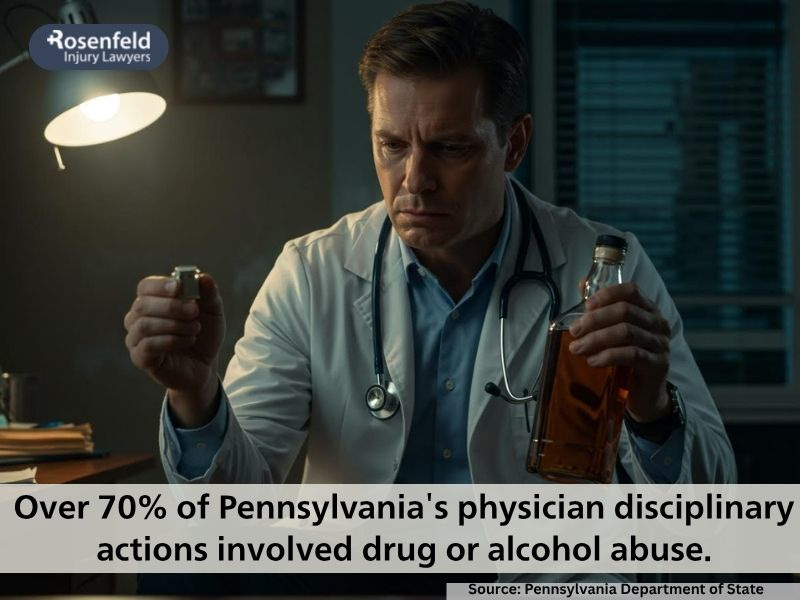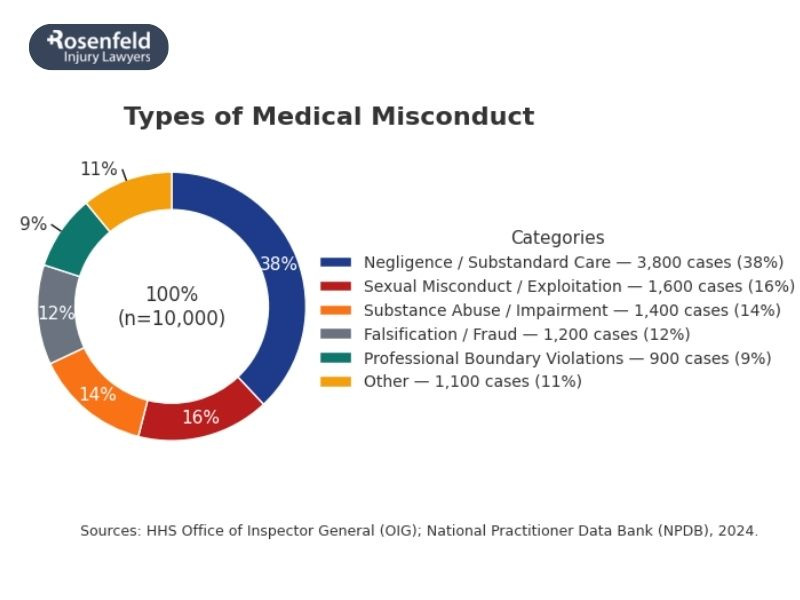What’s the Difference Between Willful Misconduct vs Gross Negligence?
Understanding the difference between willful misconduct vs gross negligence is key in many personal injury cases, especially those involving serious harm or wrongful death. While both involve conduct that goes beyond ordinary negligence, they carry different legal implications.
Willful misconduct involves an intentional or conscious disregard for the safety and rights of others. Gross negligence refers to reckless behavior or extreme carelessness that creates a high risk of harm, even if the person didn’t mean to cause injury.
These standards often come into play in civil lawsuits where victims suffer significant physical, emotional, or psychological damage. Unlike ordinary negligence, which may involve a lapse in judgment, gross negligence and willful misconduct suggest a much more serious failure to exercise reasonable care.
This guide explains the difference between willful misconduct and gross negligence, how these legal standards affect liability, and what victims can do to pursue compensation and accountability.

What Is Willful Misconduct?
Willful misconduct refers to intentional wrongdoing. It happens when a person or organization knows their actions could harm someone but chooses to move forward anyway. Unlike ordinary mistakes or careless behavior, willful misconduct involves a conscious decision to ignore known risks. It’s not a matter of poor judgment–it’s a deliberate act, done with full awareness of the potential consequences.
This type of misconduct includes an element of intent, meaning the person understood the danger but proceeded regardless. It’s a combination of awareness, choice, and disregard for others’ safety. In legal settings, similar terms are often used to describe this behavior, including intentional misconduct, conscious disregard, and reckless disregard.
Examples of willful misconduct include:
- A supervisor knowingly concealing sexual abuse allegations against an employee
- A nursing home administrator falsifying inspection reports to hide safety violations
- A physician performing medical procedures while under the influence of drugs or alcohol
Because willful misconduct shows a blatant disregard for the safety and rights of others, it often leads to punitive damages. In some situations, it may also result in criminal charges.
What Is Gross Negligence?
Gross negligence is a severe degree of carelessness that goes well beyond a simple mistake. Legally, it means someone acted with reckless disregard or showed an extreme departure from the level of care a reasonable person would use in a similar situation. While there may be no intent to harm, gross negligence implies indifference to the safety, health, or rights of others.
This level of negligence shows that the person or entity knew—or should have known—that their actions posed a significant risk, but they failed to take steps to prevent harm. In civil law systems, it’s often described using terms like reckless disregard, conscious indifference, or willful and wanton negligence.
Examples of gross negligence include:
- A daycare center ignoring repeated complaints about inappropriate staff behavior
- A company forcing employees to work in unsafe conditions despite known hazards and safety warnings
- A hospital failing to conduct background checks before hiring medical staff
When a claim involves gross negligence, courts may allow punitive or exemplary damages in addition to compensation for medical costs, lost wages, or emotional distress.

How Does Gross Negligence Differ from Ordinary Negligence?
Ordinary negligence occurs when someone fails to act with the level of care that a reasonable person would use in similar circumstances. It typically involves a mistake, oversight, or lapse in judgment–something unintentional, like forgetting to put up a wet floor sign or missing a step in routine care.
Gross negligence, on the other hand, is a much more serious breach of duty. It involves reckless disregard for the safety of others or an extreme departure from what is considered reasonable care. While ordinary negligence may be unintentional, gross negligence reflects a severe lack of concern, which courts often describe as indifference or a blatant disregard for potential danger.
This distinction matters in personal injury litigation, especially those involving nursing home abuse, medical malpractice, or wrongful death cases. When a defendant’s conduct rises to the level of gross negligence, it can eliminate caps on damages in certain jurisdictions and open the door to punitive damages. This can significantly increase the compensation available to the victim.
How Does Intentional Misconduct Differ from Negligence?
Intentional misconduct refers to actions taken with the specific purpose of causing harm. This includes deliberate acts such as sexual assault, physical violence, fraud, or abuse. In these cases, the wrongdoer isn’t just disregarding someone’s safety–they’re actively choosing to cause damage.
By contrast, negligence involves carelessness. A person may not intend harm, but their failure to act with care results in injury. Gross negligence is a step beyond, involving reckless behavior or complete carelessness that shows a disregard for others’ safety.
Willful misconduct goes even further, involving a conscious decision to ignore known risks. But intentional misconduct sits at the top–it’s purposeful harm, not just disregard.
This difference in intent can lead to severe legal consequences. If the defendant engaged in intentional misconduct, the injured may be eligible for higher compensation, including punitive damages. In many cases, intentional acts can also lead to criminal charges, not just civil liability. That means the wrongdoer may face both financial penalties and potential jail time.
Can Victims File a Negligence Claim for Willful or Gross Misconduct?
Yes, victims can file a claim even when the harm results from gross negligence or willful misconduct. In fact, these more serious forms of misconduct often strengthen the case and may lead to additional compensation.
Four key elements are needed to prove negligence:
- Duty of care – The defendant had a legal obligation to act with reasonable care toward the injured.
- Breach of duty – The defendant failed to meet that standard, whether through careless, reckless, or intentional behavior.
- Causation – The defendant’s actions directly caused the injury.
- Damages – The injured party suffered actual harm, such as medical bills, lost wages, or emotional trauma.
When the breach of duty involves willful and wanton negligence or reckless disregard for safety, courts may award punitive damages in addition to compensation for medical costs, therapy, and lost wages.
Institutions can also be held liable if they fail to train, supervise, or protect individuals in their care. This applies in settings like nursing homes, hospitals, schools, and treatment facilities.
Victims of sexual abuse, elder neglect, or catastrophic injury can often file both a civil lawsuit and an administrative complaint, pursuing justice on multiple fronts.

What Are the Legal Consequences of Gross Negligence and Willful Misconduct?
Gross negligence and willful misconduct can lead to serious consequences across three legal areas: civil, criminal, and administrative. Each tier carries different penalties, depending on the severity of the misconduct and the harm caused.
Civil liability is the most common and involves financial responsibility for the victim’s injuries. This includes compensatory damages for medical care, therapy, and emotional harm. When the conduct shows reckless disregard or intentional misconduct, courts may also award punitive damages.
Proving willful or gross misconduct can eliminate common defenses like immunity for institutions or government entities.
Criminal negligence may apply when the misconduct involves actions such as obstruction of justice, reckless endangerment, or aiding and abetting harm. This can result in fines, probation, or even imprisonment.
Administrative consequences involve penalties from licensing boards or regulatory agencies. These may include license suspension, credential revocation, or professional discipline.
For example, in an institutional sexual abuse lawsuit, a school or care facility that ignored reports or covered up misconduct could face all three forms of liability–civil, criminal, and administrative–for their role in enabling the abuse.
How Do Gross Negligence and Wilful Misconduct Affect Legal Liability?
Both gross negligence and willful misconduct can lead to civil claims, not just against individuals, but also supervisors, employers, and institutions responsible for oversight. When courts assess these cases, they focus on the defendant’s awareness of the risk and their response to it.
In cases of willful misconduct, the key question is whether the defendant knew the risk and chose to ignore it. This involves a conscious disregard for safety. In cases involving gross negligence, the standard shifts slightly: Should the defendant have known the risk but failed to act? This reflects reckless behavior or an extreme departure from what a reasonable person would do in a similar situation.
Failing to report abuse, concealing prior complaints, or ignoring clear signs of danger may qualify as either, depending on the level of awareness and indifference involved.
These issues frequently arise in schools, hospitals, nursing homes, workplaces, and corporations that fail to follow basic safety protocols. In such settings, misconduct can expose entire institutions to liability in a lawsuit, especially when a breach of duty results in harm.
What Damages Can Victims Recover for Willful or Gross Misconduct?
When a personal injury results from gross negligence or willful misconduct, victims may be entitled to compensation beyond what’s typically available in ordinary negligence cases. Courts recognize the severe impact of this conduct and allow a broader range of damages.
Economic damages reimburse direct financial losses, including medical bills, ongoing treatment, therapy, and lost income. If the injury limits future earning ability, victims may also recover for diminished earning capacity.
Non-economic damages address the personal, emotional, and psychological effects of the injury. This includes compensation for pain, suffering, emotional trauma, and the loss of quality of life. These are especially important in cases involving long-term abuse or catastrophic harm.
Punitive damages are awarded when the defendant’s actions reflect a reckless disregard or willful and wanton negligence for others’ safety. These damages are meant to punish egregious behavior and discourage similar misconduct. Punitive awards are common in sexual abuse, elder neglect, and catastrophic injury cases where willful misconduct or grossly negligent conduct is clearly proven.
How Injury Lawyer Team Can Help
At Injury Lawyer Team, we represent individuals and families in cases involving gross negligence and willful misconduct, especially when powerful institutions are responsible.
Whether the harm occurred in a nursing home, hospital, school, workplace, or residential facility, our team is prepared to take on those who failed in their duty to protect.
We understand the legal and emotional weight these cases carry. Victims of elder neglect, sexual abuse, or catastrophic injury often face long-term consequences, and they deserve more than basic compensation.

FAQs
How does willful misconduct apply in a car accident?
Willful misconduct in a car accident happens when a driver intentionally ignores known risks and harms another. This goes beyond carelessness. For example, a drunk driver who chooses to get behind the wheel despite knowing the danger may be found guilty of willful misconduct. Texting at high speeds or fleeing police while driving can also qualify. The key factor is whether the defendant engaged in behavior showing intentional disregard for the safety of other drivers.
How does gross negligence differ from medical malpractice?
Medical malpractice involves a breach of the standard of care by a healthcare professional, typically due to error or carelessness. Gross negligence, however, is more serious and reflects a complete disregard for a patient’s safety.
For example, a doctor forgetting to check allergies may be negligent, but performing surgery while intoxicated would be grossly negligent. While both types of medical misconduct support a personal injury lawsuit, gross negligence may potentially lead to punitive damages and more severe penalties, especially if the conduct shows a complete disregard for the patient’s well-being.
Can victims file a personal injury case for gross and willful misconduct?
Yes, victims can file a lawsuit when harmed by either gross negligence or willful misconduct. These cases often involve a breach of duty so severe that it goes beyond ordinary negligence. Victims must show that the defendant either ignored obvious risks or knowingly disregarded safety. This applies in wrongful death cases, elder abuse, sexual abuse, and other serious harm. When proven, these claims may result in higher compensation, including punitive damages.
Book Free Consultation on Gross Negligence & Willful Misconduct
If you or a loved one has been harmed due to gross negligence or willful misconduct, Injury Lawyer Team is here to help hold the responsible parties accountable.
We offer free consultations to review your situation and explain your legal options. Our sexual misconduct law firmworks on a contingency fee basis, which means you pay nothing unless we recover compensation for you.
Contact us today to speak with an attorney and take the first step toward justice and financial recovery.
All content undergoes thorough legal review by experienced attorneys, including Jonathan Rosenfeld. With 25 years of experience in personal injury law and over 100 years of combined legal expertise within our team, we ensure that every article is legally accurate, compliant, and reflects current legal standards.








